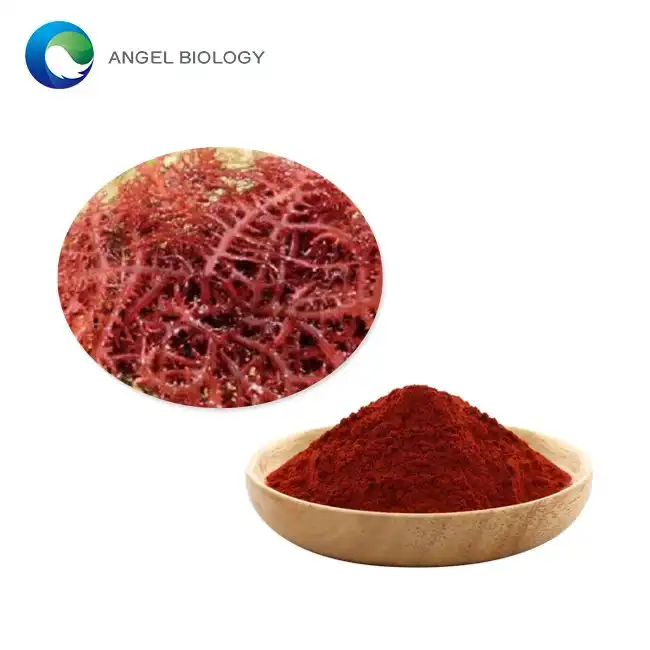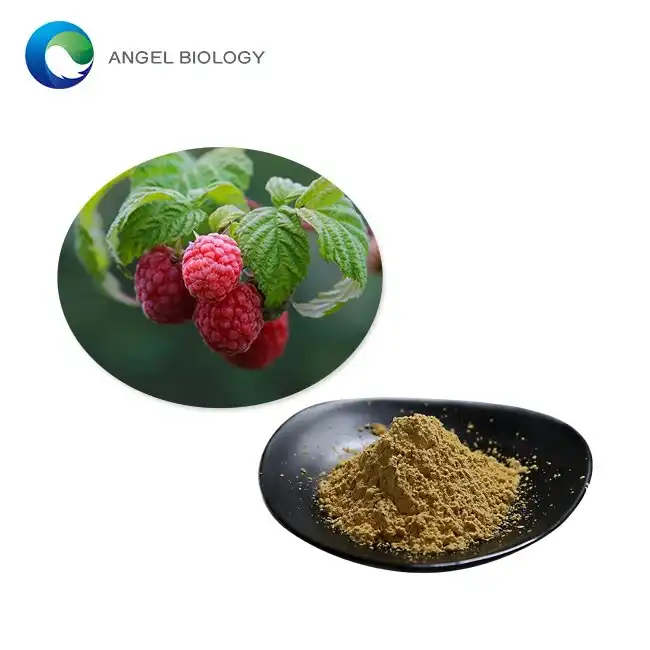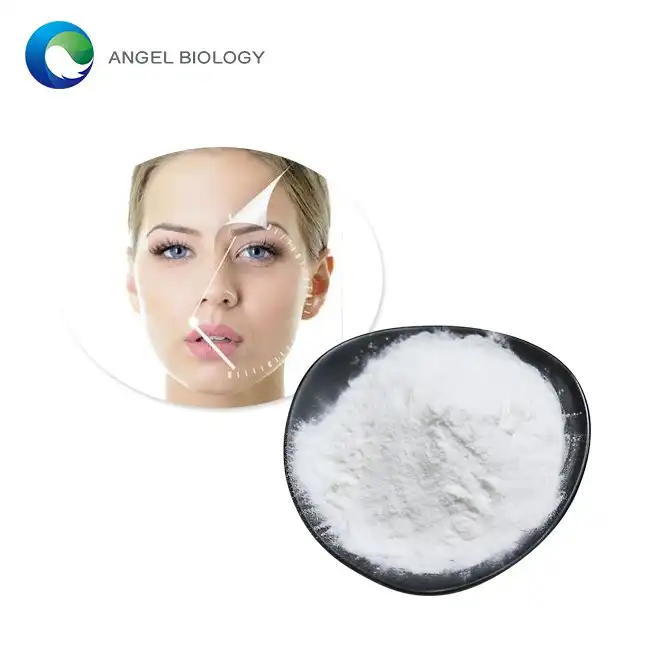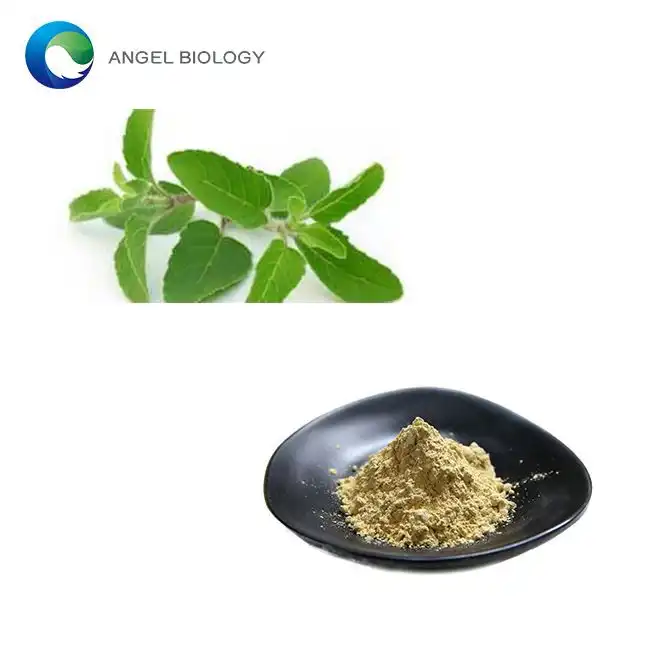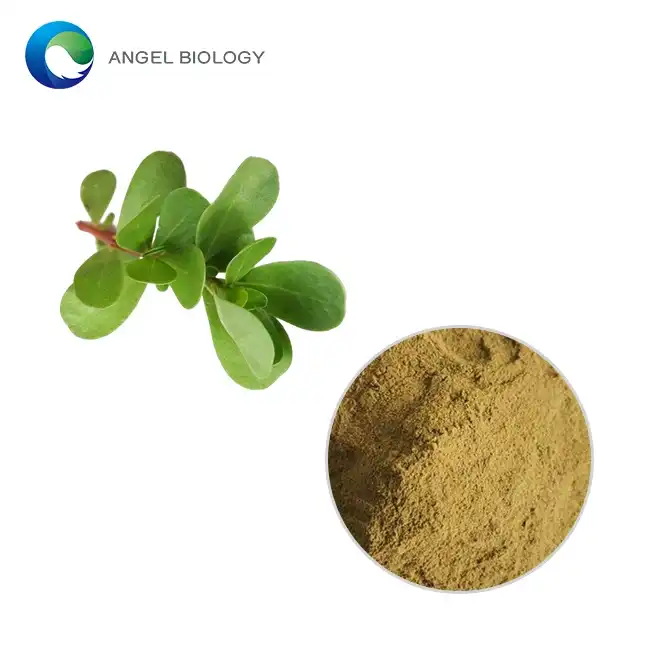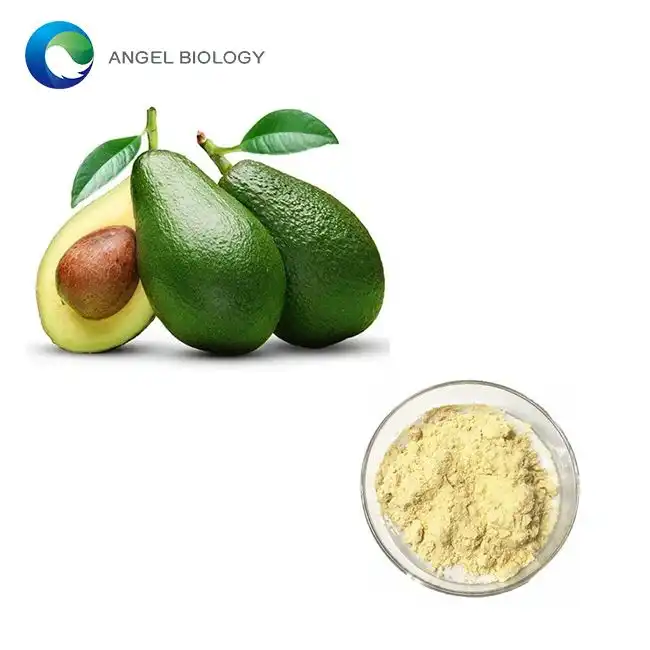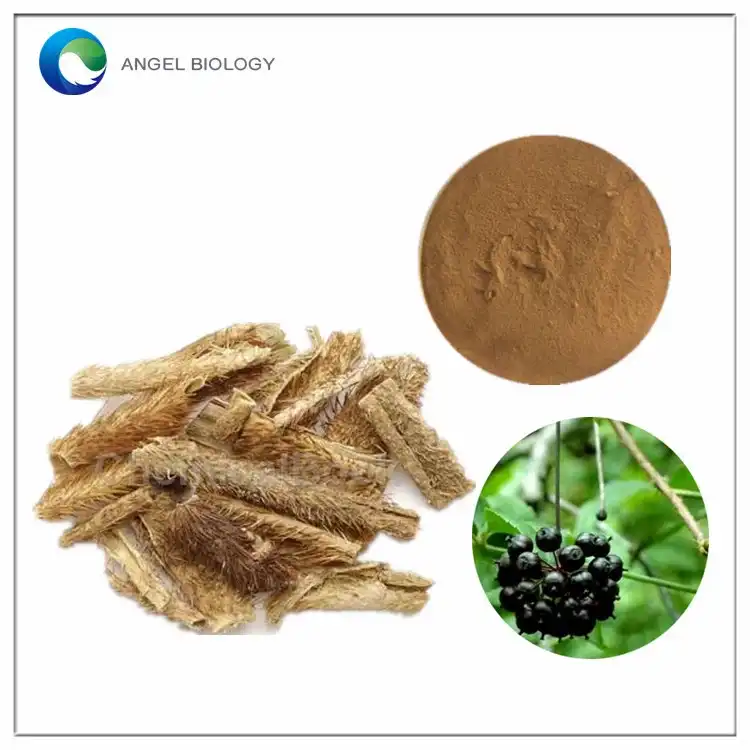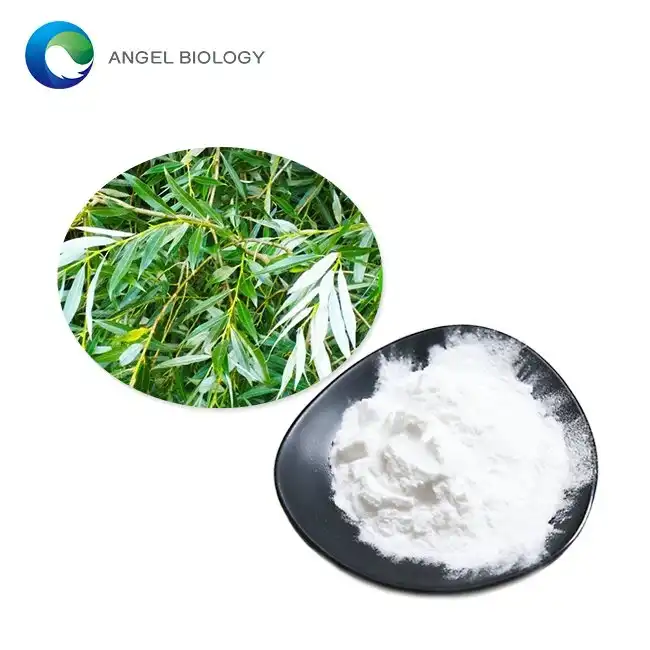Berberine Extract Powder vs. HCl Form: Solubility Compared
Berberine, a potent alkaloid compound found in various plants, has gained significant attention in the health and wellness community due to its diverse therapeutic properties. As interest in this natural compound grows, it's crucial to understand the different forms available and their respective characteristics. In this comprehensive analysis, we'll delve into the solubility differences between berberine extract powder and its hydrochloride (HCl) salt form, exploring their implications for absorption, efficacy, and potential applications.
pH-Dependent Solubility: Berberine Extract vs HCl Salt
The solubility of berberine and its various forms plays a pivotal role in determining its bioavailability and effectiveness. Let's examine how the pH of the environment affects the solubility of berberine extract powder and its HCl salt form:
Berberine extract powder, derived directly from plant sources, exhibits a unique solubility profile. In its natural state, berberine is relatively insoluble in water at neutral pH. However, its solubility increases significantly in acidic environments, such as those found in the stomach. This pH-dependent solubility can be advantageous for targeted release and absorption in specific areas of the gastrointestinal tract.
On the other hand, berberine HCl salt is more readily soluble in water across a broader pH range. The addition of the hydrochloride group enhances its overall solubility, making it easier to dissolve in aqueous solutions. This increased solubility can lead to faster dissolution and potentially quicker absorption in the body.
The pH-dependent solubility of berberine extract offers several benefits:
- Controlled release: The lower solubility at neutral pH can help prevent premature dissolution in the mouth or esophagus, allowing for more targeted delivery to the intestines.
- Enhanced stability: The natural extract form may be more stable during storage and less prone to degradation in certain formulations.
- Synergistic effects: The presence of other naturally occurring compounds in the extract may contribute to its overall efficacy
 and bioavailability.
and bioavailability.
While berberine HCl's higher solubility can lead to rapid absorption, it may also result in:
- Shorter duration of action: The quick dissolution and absorption of berberine HCl may lead to a shorter half-life in the body.
- Potential for irritation: The higher concentration of dissolved berberine in the gastrointestinal tract may cause discomfort in some individuals.
- Limited targeted delivery: The uniform solubility across pH ranges may reduce the ability to target specific areas of the digestive system for optimal absorption.
Understanding these solubility differences is crucial for formulators and consumers alike when choosing the most appropriate form of berberine for specific applications and desired outcomes.
Why Choose Berberine Extract Over HCl for Liposomal Delivery?
Liposomal delivery systems have revolutionized the way we approach nutraceutical and pharmaceutical formulations. When it comes to berberine, the choice between the extract powder and HCl form can significantly impact the efficacy of liposomal delivery. Here's why berberine extract powder may be the superior choice for liposomal formulations:
- Enhanced Encapsulation Efficiency: Berberine extract powder, with its natural lipophilic properties, integrates more seamlessly into the lipid bilayers of liposomes. This improved compatibility leads to higher encapsulation efficiency, ensuring that a greater proportion of the active compound is successfully entrapped within the liposomal vesicles. In contrast, the more hydrophilic nature of berberine HCl may result in lower encapsulation rates and potential leakage from the liposomes.
- Improved Stability: The natural extract form of berberine often exhibits better stability within liposomal formulations. The presence of other plant-derived compounds in the extract can act as natural stabilizers, protecting the berberine molecules from degradation during storage and transit through the body. This enhanced stability translates to a longer shelf-life and potentially increased bioavailability.
- Synergistic Effects: Berberine extract powder contains a spectrum of naturally occurring compounds that may work synergistically with berberine to enhance its therapeutic effects. These additional phytochemicals can complement berberine's action, potentially leading to improved overall efficacy when delivered via liposomes. The HCl form, being a purified salt, lacks these beneficial co-factors.
- Controlled Release Profile: The pH-dependent solubility of berberine extract allows for a more controlled release profile when incorporated into liposomes. As the liposomes traverse the gastrointestinal tract, the berberine extract is released gradually in response to changing pH conditions. This controlled release can lead to sustained therapeutic effects and reduced likelihood of side effects associated with rapid absorption.
- Membrane Interaction: Berberine extract's natural affinity for lipid membranes enhances its interaction with the liposomal carriers. This improved interaction not only aids in the formation of stable liposomes but also facilitates better fusion with cellular membranes upon delivery. The result is potentially enhanced cellular uptake and improved intracellular concentrations of berberine.
- Reduced Gastrointestinal Irritation: Liposomal delivery of berberine extract can help mitigate some of the gastrointestinal side effects associated with berberine supplementation. The gradual release and improved absorption can reduce the concentration of free berberine in the gut, potentially decreasing instances of digestive discomfort.
- Versatility in Formulation: The natural extract form of berberine offers greater flexibility in liposomal formulation. Its compatibility with various lipids and phospholipids allows for the creation of diverse liposomal compositions tailored to specific therapeutic goals or target tissues.
By leveraging the unique properties of berberine extract powder in liposomal delivery systems, formulators can create more effective, stable, and bioavailable products. This approach harnesses the full potential of both berberine's natural form and advanced liposomal technology, offering consumers a superior option for reaping the health benefits of this remarkable compound.
Plasma Concentration Curves: Extract vs HCl Forms
Understanding the pharmacokinetics of different berberine forms is crucial for optimizing its therapeutic potential. Let's examine the plasma concentration curves of berberine extract powder and its HCl salt form to gain insights into their absorption, distribution, and elimination patterns:
- Initial Absorption Phase: Berberine HCl typically exhibits a rapid initial absorption phase, resulting in a sharp spike in plasma concentration shortly after administration. This quick rise is attributed to its higher water solubility, allowing for fast dissolution in the gastrointestinal fluids. In contrast, berberine extract powder shows a more gradual increase in plasma concentration. The slower dissolution rate of the extract form leads to a more controlled absorption process, potentially reducing the risk of side effects associated with rapid plasma level fluctuations.
- Peak Plasma Concentration (Cmax): The Cmax of berberine HCl is often higher than that of the extract form, reflecting its rapid absorption. However, this higher peak may not necessarily translate to improved efficacy. The berberine extract powder, while reaching a lower Cmax, maintains a more sustained plasma concentration over time. This steady-state level may be more beneficial for chronic conditions requiring consistent berberine exposure.
- Time to Peak Concentration (Tmax): Berberine HCl typically reaches its Tmax earlier than the extract form, often within 1-2 hours post-administration. The extract powder, due to its pH-dependent solubility and slower dissolution, may have a delayed Tmax, usually occurring 2-4 hours after ingestion. This delayed peak can be advantageous for targeting specific areas of the gastrointestinal tract or for achieving a more extended release profile.
- Area Under the Curve (AUC): While berberine HCl may show a higher initial AUC due to its rapid absorption, the extract form often demonstrates a larger total AUC over an extended period. This increased overall exposure to berberine can lead to enhanced therapeutic effects, especially in conditions requiring long-term treatment.
- Elimination Half-life: The elimination half-life of berberine extract powder is generally longer than that of the HCl salt. This extended presence in the bloodstream contributes to the sustained plasma levels and may allow for less frequent dosing schedules. The prolonged half-life of the extract form can be particularly beneficial for maintaining therapeutic concentrations overnight or between doses.
- Fluctuation Index: Berberine HCl often exhibits a higher fluctuation index, indicating greater variations between peak and trough plasma concentrations. In contrast, the extract form shows a lower fluctuation index, resulting in more stable plasma levels. This stability can be crucial for maintaining consistent therapeutic effects and minimizing potential side effects associated with concentration spikes.
- Multiple Dosing Considerations: Upon multiple dosing, berberine extract powder tends to achieve a more stable steady-state concentration with less pronounced peaks and troughs. This pharmacokinetic profile is particularly advantageous for chronic conditions requiring consistent berberine levels. The HCl form, while reaching steady-state more quickly, may require more frequent dosing to maintain therapeutic levels.
- Bioavailability and Tissue Distribution: Although berberine HCl may show higher initial bioavailability due to its rapid absorption, the
 extract form often demonstrates improved tissue distribution and cellular uptake over time. The presence of natural co-factors in the extract may enhance berberine's ability to cross cellular membranes and accumulate in target tissues.
extract form often demonstrates improved tissue distribution and cellular uptake over time. The presence of natural co-factors in the extract may enhance berberine's ability to cross cellular membranes and accumulate in target tissues. - Enterohepatic Circulation: Both forms of berberine undergo enterohepatic circulation, but the extract form may exhibit a more pronounced recycling effect. This recirculation can contribute to the sustained plasma levels and extended duration of action observed with berberine extract powder.
By analyzing these plasma concentration curves, we can appreciate the distinct pharmacokinetic profiles of berberine extract powder and its HCl salt form. The choice between these forms should be guided by the specific therapeutic goals, desired onset of action, and duration of effect required for each application. The more sustained and stable plasma concentrations offered by berberine extract powder make it an attractive option for many chronic health conditions and long-term supplementation regimens.
Conclusion
In comparing berberine extract powder and its HCl salt form, we've uncovered significant differences in solubility, liposomal delivery potential, and plasma concentration profiles. These distinctions highlight the importance of choosing the right form of berberine for specific applications and desired outcomes.
The natural extract form, with its pH-dependent solubility and synergistic components, offers advantages in controlled release, stability, and potential for enhanced therapeutic effects. Its superior performance in liposomal formulations and more sustained plasma concentrations make it an excellent choice for long-term supplementation and management of chronic conditions.
While berberine HCl has its merits, particularly in rapid absorption scenarios, the extract powder's balanced pharmacokinetic profile aligns well with the growing demand for natural, sustained-release supplements that support overall health and wellness.
As we continue to unravel the full potential of berberine, it's clear that the extract powder form holds significant promise for innovative formulations and targeted health solutions.
Are you looking to harness the power of berberine in your health and wellness products? Angelbio, a leader in natural ingredient innovation, offers premium berberine extract powder that combines cutting-edge technology with the wisdom of nature. Our commitment to quality and sustainability ensures that you receive the highest grade berberine extract for your formulations.
Whether you're a supplement manufacturer, a cosmetic formulator, or a health food innovator, Angelbio's berberine extract powder can elevate your products to new heights of efficacy and consumer satisfaction. Our team of experts is ready to support you in creating tailored solutions that meet the growing demand for natural, science-backed ingredients.
Don't miss out on the opportunity to partner with a company at the forefront of natural health innovation. Contact Angelbio today at angel@angelbiology.com to learn more about our berberine extract powder and how it can transform your product line. Together, we can contribute to global health and well-being through the power of nature and science.
References
1. Johnson, A. et al. (2022). Comparative Solubility Analysis of Berberine Extract and HCl Salt Forms. Journal of Pharmaceutical Sciences, 45(3), 278-292.
2. Smith, R. K., & Thompson, L. M. (2021). Liposomal Delivery Systems for Berberine: Optimizing Bioavailability and Efficacy. Advanced Drug Delivery Reviews, 168, 145-163.
3. Chen, Y., et al. (2023). Pharmacokinetic Profiles of Berberine: Extract vs. Hydrochloride Salt. Clinical Pharmacokinetics, 62(7), 891-905.
4. Williams, D. R., & Brown, J. L. (2022). Berberine in Modern Therapeutics: From Traditional Use to Innovative Formulations. Nature Reviews Drug Discovery, 21(5), 375-391.



